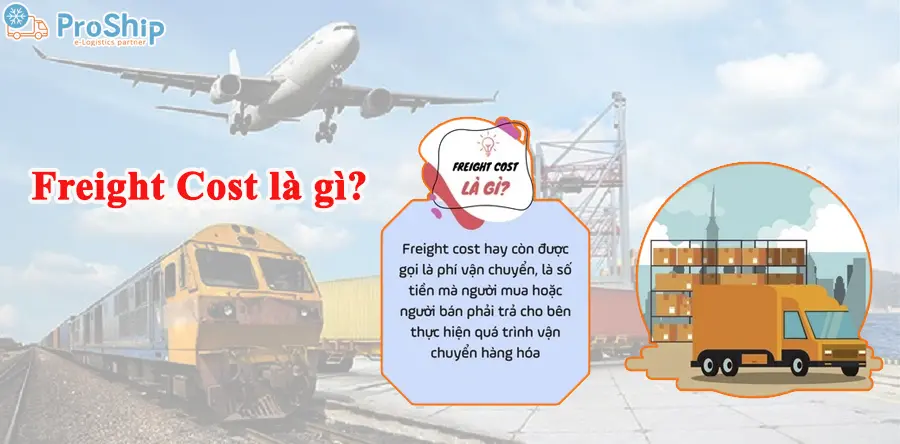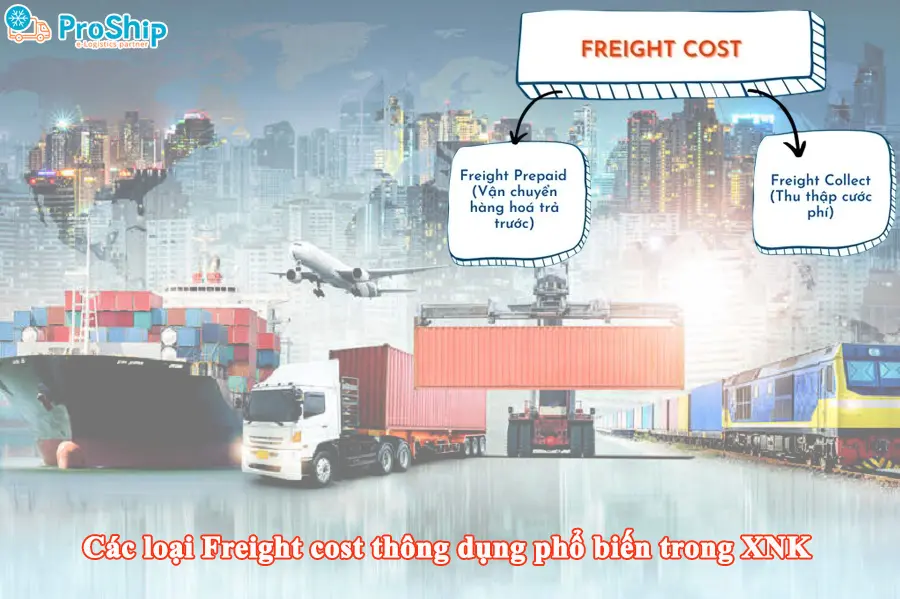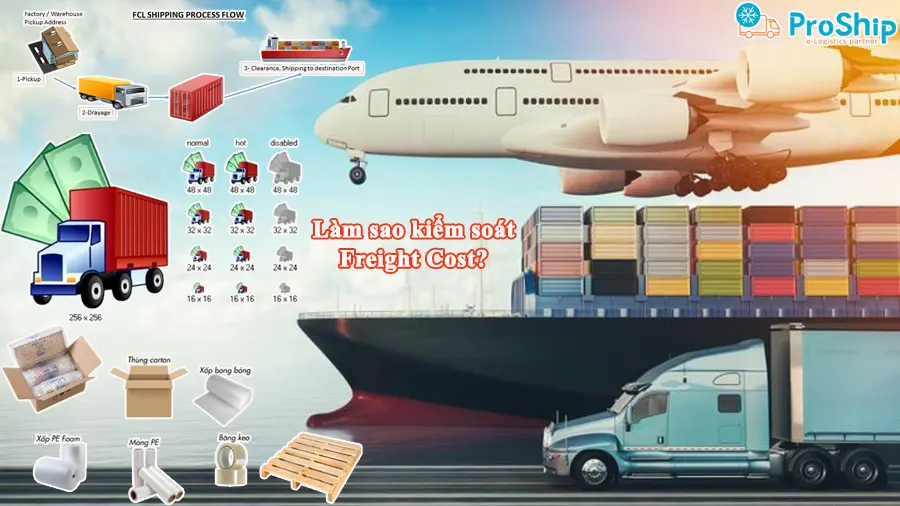x Have businesses, shippers, road, rail, sea transport units, etc. heard of Freight Cost - a quite familiar term, but newcomers to the industry do not understand what Freight Cost is?
x Are you interested and want to know what types of Freight Cost in import-export currently include?
x Do you want to know freight regulations as well as how to control Freight Cost?
Next, at Proship.vn will collect relevant knowledge to clarify what freight cost is, what are the common types of freight costs in import and export activities of goods... At the same time, we will discuss regulations as well as regulations. as an effective way to control freight costs today.
What is freight cost? What factors affect freight rates?
Freight cost concept
During the transportation of goods, buyers and sellers will have to pay a certain fee to the Shipping Unit. This fee is called Freight cost. So, what is freight cost?
Freight cost, also known as shipping fee, is the amount of money that the buyer or seller must pay to the party carrying out the transportation of goods. Regardless of the form of transportation, whether by road, sea or air, this fee is required to be paid by the buyer or seller.

Factors affecting freight rates
What are the factors that affect freight cost? Freight costs are often not fixed but depend on many factors such as:
- Weight and size: The larger and heavier, the higher the shipping cost;
- Type of goods: High-value, perishable, or dangerous goods often come with higher shipping costs;
- Shipping distance: Shipping fee will increase according to the length of the route from origin to destination;
- Mode of transportation: Each type of method such as sea, air, and road has different rates;
- Shipping time: Express shipping service, costs more than standard shipping options;
- Supply and demand: Transport market conditions can fluctuate in transport costs;
- Surcharges: Additional fees such as fuel fees, security fees, and cargo handling fees also contribute to increasing total shipping costs.
Popular types of Freight costs
Currently, people divide Freight costs into two main types: Freight Prepaid and Freight Collect. Specifically:
- Freight Prepaid:
A form of payment in which the shipper pays the freight and has ownership of the goods until the recipient receives the goods and pays the invoice.
- Freight Collect:
A form of payment in which the consignee pays the freight and takes ownership when the carrier receives the goods.

The bill of lading can describe fees in many different ways such as:
- Recipient of collection:
The consignee is responsible for paying shipping costs, handling import and export customs procedures and paying applicable taxes or other forms.
- Full or half prepayment:
The shipper pays the freight in full or in half in advance.
- Third party:
Usually a logistics company, specializing in handling payment for shipping fees.
- Cash on delivery (COD):
Upon delivery, the consignee pays the carrier and the carrier reimburses the shipper.
- Freight-on-Board or Free-on-Board (FOB):
The consignee is responsible for freight and pays all freight when the goods are delivered to the shipper's terminal.
- FOB Destination:
At the consignee's terminal, title to the goods is transferred and the consignor takes care of the shipping costs.
- FOB Destination, Freight Collect:
At the consignee's terminal, title to the goods will be transferred and the consignee will then take care of the freight charges.
- FOB destination, collect and allow freight:
Same as above but except that the consignee deducts the shipping fee from the shipper's invoice.
Regulations on freight charges you need to know
What are the regulations on freight costs? Normally, transportation companies will regulate their own shipping charges. However, the fees from transport units must comply with legal regulations.
Accordingly, some regulations on shipping costs can include:
- For light goods such as letters, gifts or personal documents, they will be weighed directly at the receiving point. Accordingly, the regulations on shipping charges are as follows:
Shipping cost = actual quantity of goods x unit price.
- For heavy and bulky goods, shipping prices will be higher than for light goods. Accordingly, regulations on shipping charges are as follows:
Shipping fee = converted weight of goods x unit price.
- For oversized and super heavy goods with a volume greater than 1 ton, exported abroad at large ports and containers, the regulations on shipping charges are as follows:
Shipping fee = converted weight x unit price.
Ways to control Freight Cost transportation costs
To control Freight Cost freight costs, shippers and businesses can apply:
Consolidate shipments
Consider combining multiple shipments into one partial or full load shipment if they are facing the same direction instead of splitting them up. For carriers that base freight rates on density and type, packaging materials can significantly change the cost of shipping goods. Remember to include the weight of packaging materials in your information.
If you import Chinese goods in small quantities, if you want to save costs, you can choose the form of combining Cont. To calculate shipping costs, some important information to know includes: packaging type, product type, shipment size and weight, delivery zip code, and any special requirements during transportation. or not,…

Use effective packaging materials
Consider different packaging methods and make sure you are using the right packaging method for your goods. Don't simply shrink wrap an item, wrap it.
When you pack or crate your goods, pay as much attention to the insulation as you did to the outer layer. Avoid payment adjustments and higher freight costs by ensuring the shipment is free of any overhangs. The best packaging method is to use wooden crates as it provides the most reliable protection.
Thus, Proship Logistics has helped you understand more about the specialized terminology freight cost , what are the factors that determine freight cost, etc. along with sharing how to easily Easily control freight costs during the process of exporting and importing goods. And if you need to use our cheap, comprehensive Multimodal Transport Service, contact us immediately at 0909 344 247 .
